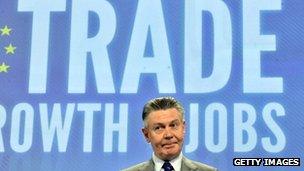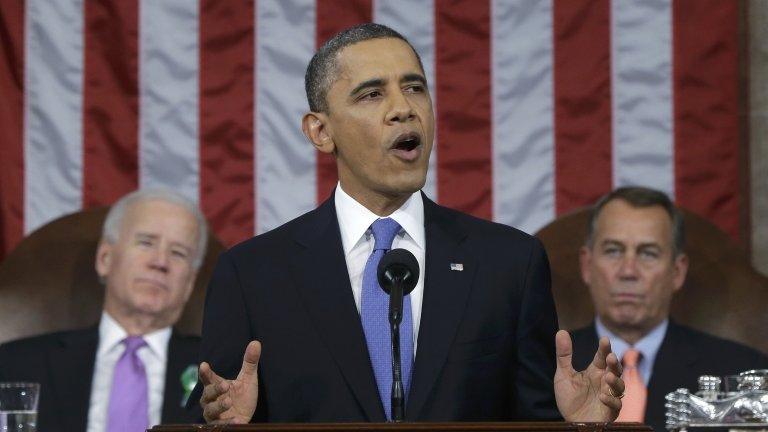EU 'growth boost from US free-trade deal'
- Published

Mr De Gucht said that both economies were still affected deeply by the crisis of 2008
Europe's most senior trade official has said that a free-trade agreement between the US and European Union would boost its growth by as much as 1%, leading to many more jobs.
The EU and US recently began formal talks on a trade deal.
The deal would be the biggest free-trade agreement in history.
EU Trade Commissioner Karel De Gucht said that both were still "suffering the effects of the earthquake that hit our economies in 2008".
"This is the cheapest stimulus package you can imagine," he told an audience at Harvard University on Saturday, saying that for the EU, "the income effects of the deal that we are now trying to achieve should be between 0.5% and 1% of GDP, meaning hundreds of thousands of jobs".
EU-US trade is currently worth around 455bn euros (£393bn; $613bn) a year.
The EU aims to have negotiations done by 2014, before a new European Commission is seated.
"Trade is an indispensable ingredient of prosperity," Mr De Gucht said. "It brings new customers for our exporters, cheaper components for our producers and more competition to make all our companies more efficient.
"The easiest part will be removing the duties that remain on goods. The average tariff barriers are already low, between 3% and 5%, but there is no reason they should not go to zero. The other issues will be harder, but if can tackle them the payoff will be a big one."
A deal would bring down trading barriers between the two biggest economies in the world. The EU estimates that a "comprehensive and ambitious agreement" will boost annual GDP growth by 0.5%.
Mr De Gucht also noted that trade talks at the World Trade Organization had stalled, "largely because of differences of view between developed powers - like the US and the European Union - and the rising stars.
"An EU-US partnership can act as a policy laboratory for the new trade rules we need - on issues like regulatory barriers, competition policy, localisation requirements, raw materials and energy."
- Published13 February 2013

- Published24 September 2015